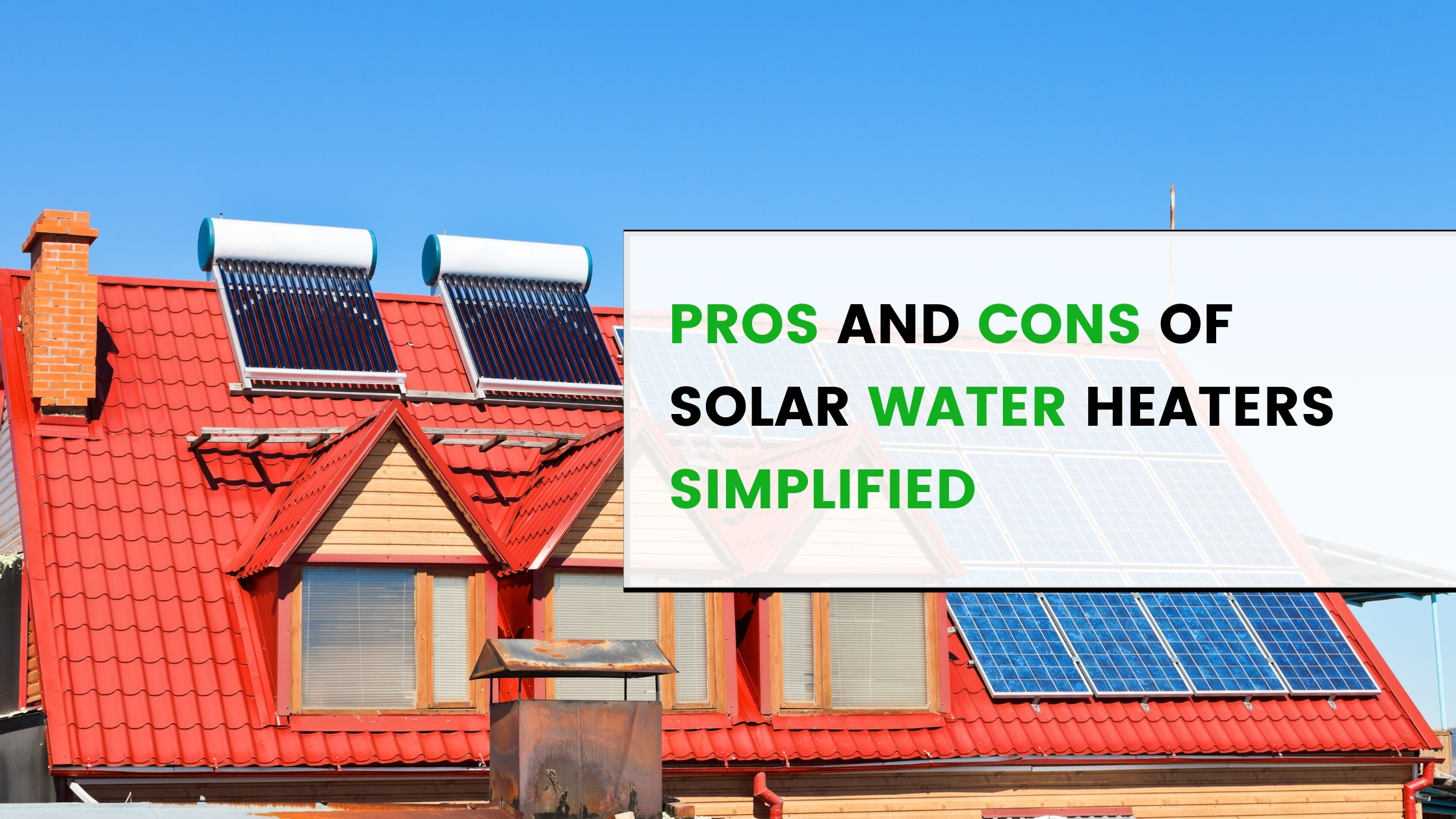
Varistor Solar is dedicated to empowering individuals, businesses, and communities with the transformative power of solar energy. We believe in a brighter, cleaner future and are committed to making sustainable living accessible to everyone.
+91-9113690456
Email: sales@varistorsolar.com
Varistor Solar
NO 40/C, KALKERE VILLAGE,12TH MAIN, NRI LAYOUT,Ramamurthy Nagar, Bangalore North,Bangalore- Karnataka, 560016
Introduction
In a world where sustainable living has become a buzzword, individuals and businesses are increasingly turning to alternative energy sources. One such eco-friendly solution gaining popularity is the solar water heater. Harnessing the abundant power of the sun, solar water heaters are making waves in the realm of energy-efficient technologies. In this blog post, we will delve into the primary advantages and disadvantages of solar water heaters, shedding light on their potential benefits and drawbacks. 
Advantages of Solar Water Heaters
- Renewable Energy Source
The foremost advantage of solar water heaters lies in their utilization of a renewable energy source: sunlight. Unlike traditional water heaters that rely on electricity or gas, solar water heaters tap into the sun's energy, which is an infinitely available resource. This not only reduces dependence on non-renewable energy but also contributes to a greener and more sustainable future.
- Cost Savings Over Time
While the initial investment for installing a solar water heater may seem substantial, the long-term cost savings are a significant advantage. Solar water heaters operate using sunlight, which is free of charge. Once the system is set up, users can experience a noticeable reduction in their monthly energy bills, ultimately recovering the initial investment over time.
- Environmentally Friendly
Choosing a solar water heater is a step towards reducing your carbon footprint. By harnessing solar energy, these systems produce minimal greenhouse gas emissions compared to conventional water heaters. As the world grapples with climate change, opting for environmentally friendly solutions becomes crucial, and solar water heaters align perfectly with this objective.
- Low Operating Costs
Solar water heaters have lower operating costs compared to their conventional counterparts. The maintenance requirements are minimal, and the systems generally have fewer components that can wear out over time. This translates to fewer repair expenses and a longer lifespan for the solar water heater, providing additional cost benefits to users.
- Government Incentives and Subsidies
Many governments around the world offer incentives and subsidies to encourage the adoption of solar technologies, including solar water heaters. These incentives can offset a significant portion of the initial installation costs, making the transition to solar energy more financially attractive for homeowners and businesses alike.
- Energy Independence
Solar water heaters provide a degree of energy independence to users. By relying on the sun's energy, individuals and businesses can reduce their dependence on external energy sources, contributing to energy security on a personal and national level.
- Reduced Water Heating Bills
One of the primary functions of a solar water heater is to heat water for various household or industrial purposes. By harnessing solar energy for this task, users can significantly reduce their water heating bills. This is particularly advantageous in regions where conventional energy prices are high.
- Long Lifespan
Solar water heaters are known for their durability and long lifespan. With proper maintenance, these systems can last for 20 years or more. This longevity contributes to the overall cost-effectiveness of solar water heaters, as users can enjoy the benefits of reduced energy bills for an extended period.
- Low Environmental Impact
Unlike conventional water heaters that may contribute to air and water pollution, solar water heaters have a minimal environmental impact. The process of harnessing solar energy to heat water generates no emissions or pollutants, making it a clean and eco-friendly choice for environmentally conscious consumers.
- Increased Property Value
The installation of solar water heaters can enhance the value of a property. As more homebuyers prioritize energy efficiency and sustainable features, having a solar water heater in place can make a property more attractive and potentially increase its resale value.
Disadvantages of Solar Water Heaters
- High Initial Cost
The upfront cost of purchasing and installing a solar water heater is often cited as a significant drawback. While the long-term savings can offset this initial investment, the high upfront cost can be a barrier for some individuals and businesses, especially in regions where government incentives are limited.
- Weather Dependency
Solar water heaters are dependent on sunlight, and their efficiency can be affected by weather conditions. Cloudy days or extended periods of rain can reduce the amount of sunlight reaching the solar panels, impacting the system's ability to heat water effectively. In regions with inconsistent sunlight, this can be a notable disadvantage.
- Space Requirements
Installing a solar water heater requires adequate space for the solar panels. In urban areas where space is limited, finding a suitable location for the panels may pose a challenge. Additionally, aesthetic concerns may arise as solar panels need to be installed in a way that maximizes exposure to sunlight, which may not always align with the desired visual appeal of a property.
- Energy Storage Challenges
Solar water heaters are designed to operate when sunlight is available. However, they may not be as effective during nighttime or cloudy periods. To address this, additional components like backup heating systems or energy storage solutions may be required, adding complexity and cost to the overall system.
- Installation Complexity
The installation of a solar water heater is a specialized task that requires professional expertise. Ensuring proper placement, alignment, and connection of the system components is crucial for optimal performance. This complexity can lead to higher installation costs and may limit the accessibility of solar water heaters to certain regions or demographic groups.
- Maintenance Requirements
While solar water heaters generally have lower operating costs, they are not entirely maintenance-free. Regular maintenance is essential to ensure the system functions efficiently. This may include cleaning the solar panels, checking for leaks, and inspecting other components. Failure to perform routine maintenance can result in decreased performance and potential repair costs.
- Limited Effectiveness in Certain Climates
In extremely cold climates, where temperatures drop significantly below freezing, the effectiveness of solar water heaters may be limited. The freezing temperatures can pose a risk of damage to the system, and additional measures such as antifreeze solutions may be required, further complicating the system design.
- Technology Advancements
The field of solar technology is continually evolving, with new and more efficient technologies emerging regularly. Individuals who invest in solar water heaters may find themselves with outdated technology as advancements occur. Staying abreast of the latest developments and upgrading systems accordingly can become a consideration for some users.
- Permitting and Zoning Regulations
The installation of solar water heaters may be subject to permitting and zoning regulations in certain areas. Navigating these bureaucratic hurdles can be time-consuming and may require additional effort and resources. Understanding local regulations before investing in a solar water heater is crucial to avoid complications during and after installation.
- Weight of Solar Panels
Solar panels, while durable, can be heavy. This weight may pose structural concerns, especially for older buildings or structures not originally designed to accommodate the added load. Reinforcements or structural assessments may be necessary, adding to the overall cost and complexity of the installation process.
Conclusion
In the quest for sustainable living and reduced environmental impact, solar water heaters emerge as a promising solution. The advantages, from cost savings to environmental benefits, make them an attractive option for those willing to make the initial investment. However, it's essential to consider the disadvantages as well, such as weather dependency and high upfront costs. As technology advances and governments continue to prioritize renewable energy, the landscape for solar water heaters may evolve. The key is to weigh the pros and cons carefully, considering individual circumstances, climate conditions, and budget constraints. Solar water heaters have the potential to revolutionize the way we heat water, offering a cleaner, more sustainable alternative to traditional methods. As the sun continues to shine, the future of solar water heaters looks brighter than ever.
Frequently asked Questions
Solar water heaters use sunlight to heat water in solar collectors. These collectors absorb sunlight, converting it into heat that warms the water, providing an eco-friendly way to meet your hot water needs.
Solar water heaters work best in regions with consistent sunlight, but advancements, like antifreeze solutions, make them adaptable to various climates. Consider your local weather patterns when deciding on a system.
Solar water heaters have a durable design, with an average lifespan of 20 years or more. Regular maintenance, like cleaning panels and checking for leaks, helps extend their life.
Savings vary, but users typically see significant reductions in water heating bills over time. Despite the initial investment, the long-term savings make solar water heaters a cost-effective and green choice.
Installation is a specialized task best handled by professionals. Hiring a qualified installer ensures proper setup, alignment, and compliance with safety standards for efficient and trouble-free operation.
Final Say:
If you are thinking to buy a solar water heater, Varistor Solar™ will be the right choice for you. Don't hesitate to call us at 9113690456 or email us at sales@varistorsolar.com. Let's embark on this green journey together and make a positive impact on the environment and our lives.
"WHAT YOU CAN READ NEXT"
 Read more +03 September 2024 in Solar Water Heater
Read more +03 September 2024 in Solar Water HeaterWhich is the Best Solar Heater Brand in Yeshwanthpura, Bengaluru
 Read more +03 September 2024 in Solar Water Heater
Read more +03 September 2024 in Solar Water HeaterWhich is the Best Solar Heater Brand in Yelchenahalli, Bengaluru
 Read more +03 September 2024 in Solar Water Heater
Read more +03 September 2024 in Solar Water Heater




